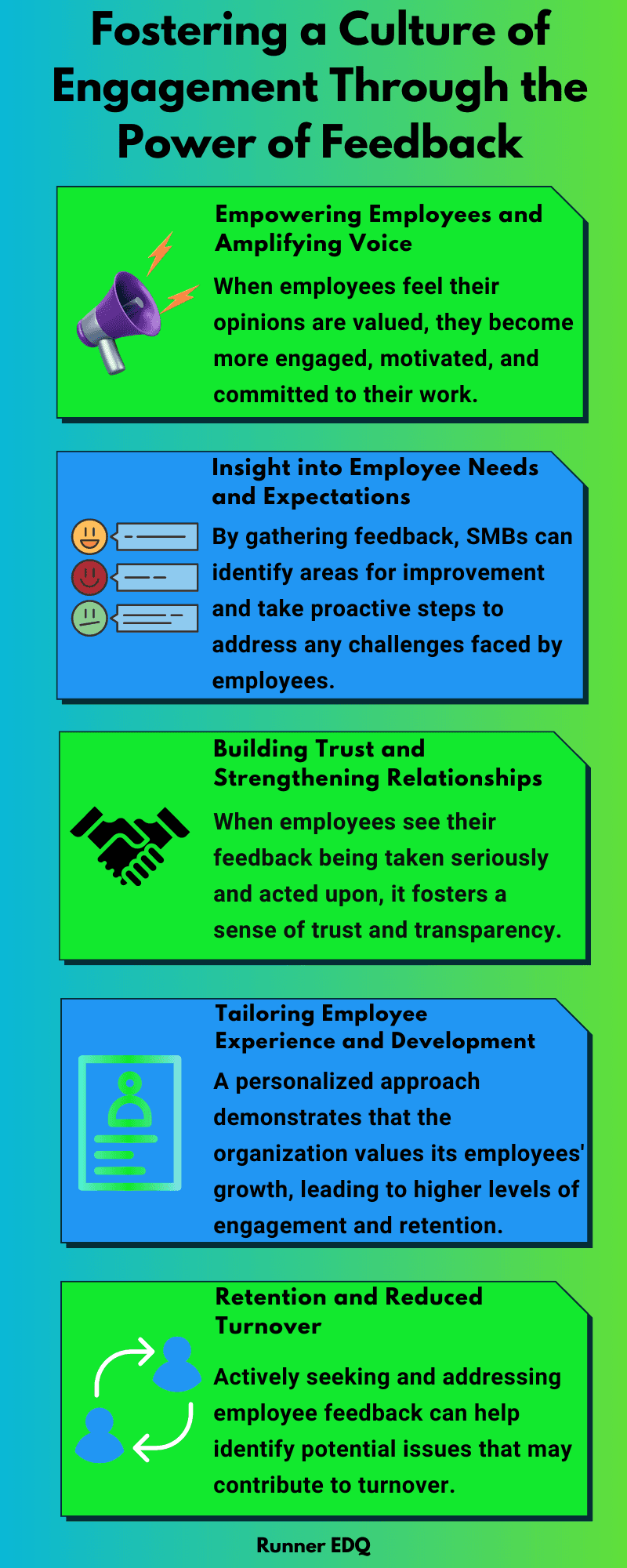A Great Way Generate Engagement For Your Organization
2 MINUTE READ
In today's competitive business landscape, small to medium businesses (SMBs) need to prioritize employee engagement to drive success and growth. One effective way to foster a culture of engagement is by encouraging employees to provide feedback about their employee experience. Let’s explore the significance of employee feedback in enhancing engagement and retention within SMBs. We will also highlight the importance of maintaining a clean database of employee data for effective decision-making and organizational development.
Empowering Employees and Amplifying Voice
Encouraging employee feedback empowers individuals and gives them a voice within the organization. When employees feel their opinions and perspectives are valued, they become more engaged, motivated, and committed to their work. By providing platforms for feedback, such as surveys, suggestion boxes, or regular check-ins, SMBs create an environment that values open communication, collaboration, and continuous improvement.
Insight into Employee Needs and Expectations
Employee feedback offers valuable insights into the needs, expectations, and experiences of the workforce. It helps SMBs understand what drives employee satisfaction and engagement, enabling them to make informed decisions regarding policies, processes, and work environment enhancements. By gathering feedback, SMBs can identify areas for improvement and take proactive steps to address any concerns or challenges faced by employees.
Building Trust and Strengthening Relationships
Employee feedback plays a pivotal role in building trust between employees and the organization. When employees see their feedback being taken seriously and acted upon, it fosters a sense of trust and transparency. This, in turn, strengthens the relationship between employees and the SMB, creating a positive work culture and increasing employee engagement and loyalty.
Tailoring Employee Experience and Development
Feedback from employees provides valuable insights into their career aspirations, development needs, and preferences. By understanding their goals and interests, SMBs can customize learning and development programs, career advancement opportunities, and job assignments. This personalized approach demonstrates that the organization values and invests in its employees' growth, leading to higher levels of engagement and retention.
Retention and Reduced Turnover
Employee feedback has a direct impact on retention rates. When employees feel heard and valued, they are more likely to stay with the organization. Actively seeking and addressing employee feedback can help identify potential issues that may contribute to turnover. By addressing these concerns and making necessary improvements, SMBs can create an environment that fosters loyalty, reduces turnover, and retains top talent.
Importance of Maintaining a Clean Database of Employee Data
Maintaining a clean and updated database of employee data is crucial for SMBs. A clean database ensures accurate and reliable information for decision-making, planning, and implementing HR strategies. It enables organizations to identify trends, track employee progress, and monitor engagement levels over time. Additionally, a clean database protects sensitive employee information, ensuring compliance with privacy regulations and building trust among employees.
Encouraging employee feedback is a powerful strategy for SMBs to foster a culture of engagement, enhance retention rates, and drive organizational success. By empowering employees, gaining insights into their needs, building trust, tailoring the employee experience, and reducing turnover, SMBs can create an environment that values and supports their workforce. Furthermore, maintaining a clean database of employee data is essential for accurate decision-making and safeguarding employee information. By prioritizing employee feedback and maintaining data integrity, SMBs can cultivate a culture of engagement that fuels growth, productivity, and employee satisfaction.







